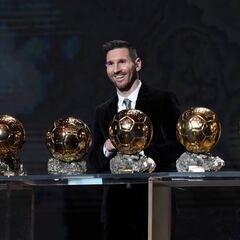Which team has the most Ballon d’Or winners in history?
With Madrid’s prolific No. 9 having been crowned 2022′s Ballon d’Or, the Merengues are now level with the Catalan kings for most ever in the award’s history.


Until this year, the modern Ballon d’Or was essentially a choice between Leo Messi and Cristiano Ronaldo. Indeed, both players have given the clubs where they won the bulk of their individual accolades, Barcelona and Real Madrid respectively, a boost in the overall standing in terms of club wins: Barcelona have 12 overall (six courtesy of Messi) and Madrid who were on 11 (five from Ronaldo) have now draw level.
Here is the image you've all been waiting for! Karim Benzema! #ballondor with @adidasFR pic.twitter.com/TJze0Km1s6
— Ballon d'Or #ballondor (@francefootball) October 17, 2022
With Karim Benzema being awarded the 2022 Ballon d’Or, not only does it appear as though the Messi/Ronaldo monopoly has come to an end, but the truly deserving Frenchman has brought his club level with their eternal rivals and he did so in stunning fashion. Where the remainder of teams on the list are concerned, they were spread between a total of 11 different players.
Juventus, Milan challenge to Real Madrid and Barcelona
Juventus are third on the list of clubs with most Ballon d’Or winners, spurred by Michel Platini’s personal treble for the Serie A side between 1983 and 1985 and Italy great Paolo Rossi’s 1982 triumph for guiding the Azzurri to the World Cup with six goals in Spain, a feat almost matched four years later by Toto Schillaci, who won the Golden Boot on home turn four years later but missed out on the Ballon d’Or to Lothar Matthäus, who captained Germany to victory at the 1990 World Cup while playing for Inter Milan, one of only two Ballons d’Or for the current Serie A champions.
#OnThisDay photo from 1985.
— The Culture of Football Classics (@CFclassics) April 15, 2019
Michel Platini presented with the Ballon d’Or award after his phenomenal performances for Juventus & France. pic.twitter.com/e0qL2Fd5s1
Inter’s city rivals AC Milan are level with Juve in the Ballon d’Or stakes with eight each for the Italian giants, three of which were won by Netherlands striker Marco van Basten (1988, 1989 and 1992) with Ruud Gullit, another member of Arrigo Sacchi’s legendary Milan side, winning in 1987. Kaká was the last Rossoneri to lift the individual award in 2007, before the Messi-Ronaldo duopoly began in earnest.
Among some of the club who may have expected to have more Ballons d’Or in their histories, Liverpool stand out with just the one, awarded to Michael Owen in 2001 after the club’s treble cup success. Hamburg, meanwhile, have two, both won by England forward Kevin Keegan in 1978 and 1979.
Stanley Matthews winning the first Ballon d'Or (1956) #history #BallonDor pic.twitter.com/hAs88GUZwQ
— EdutainmentDaily (@EdutainDaily) October 17, 2022
The least likely side on the list of club winners is surely Blackpool, whose one Ballon d’Or was the first-ever awarded, in 1956, to Sir Stanley Matthews, who beat competition from Alfredo di Stéfano and Raymond Kopa. An honourable mention in that respect goes to Dukla Prague, who have a Ballon d’Or winner to their name courtesy of Josef Masopust’s heroics for Czechoslovakia at the 1962 World Cup. In terms of wins by country, Germany, the Netherlands and Portugal lead the way with seven wins each, while Messi’s six Ballons d’Or place Argentina second.
France Football’s non-European re-evaluation
If you didn’t know, non-European players were not eligible for the Ballon d’Or before 1995, when George Weah made history as the first and to date only African player to win the award, the Milan forward also picked up the FIFA World Player of the Year Award.
Never Forget 1995 Ballon d’Or, George Weah pic.twitter.com/snC37CWQXy
— MY DMC SPORTS (@mydmcsports) October 17, 2022
Related stories
Naturally the main beneficiary of the revision was Brazil great Pelé, who had been eligible for the award would - under France Football’s evaluation - have won seven times (1958-61, 1963-64 and 1970), placing the three-times World Cup winner firmly on the all-time podium, and Santos third on the list of most successful clubs in Ballon d’Or history.
Garrincha would also have been honoured in 1962 when he shouldered the burden of leading Brazil to the World Cup after Pelé's injury early in the tournament in Chile. Romário was also adjudged to have been a worthy winner in 1994 for similar reasons. Diego Maradona would have won in 1986 for his World Cup exploits, and in 1990 for guiding Napoli to the Serie A title and Argentina to the World Cup final.

